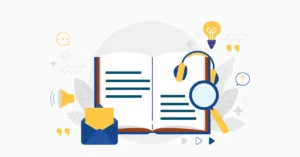
IGCSE English as a Second Language: Listening, Writing, and Speaking
Preparing for your IGCSE English as a Second Language (ESL) exam can feel daunting. You are not just learning grammar
Learn how to write step-by-step answers, and score A* in your exam!

Announcement: Cambridge IGCSE, O Level and AS & A Level June 2025 past papers are now available.
There are four Reading exercises in the English as a Second Language 0510/0511 Reading and Writing papers - for both Paper 1 (Core) and Paper 2 (Extended). Here, we provide five exam tips to score well in Reading.
You do not have to write full sentences in the reading part. Writing two or three words, sometimes even one, is sufficient to answer these questions. Show the examiner that you understand the passage well and that you are able to provide the right answer.
For example, if the question asks: “How often is the carnival held?”, you can answer “once a year” or “annually”.
There is no need to answer, “The carnival is held once a year” or “The carnival is held annually”.
In this way, you save time for questions that require longer response time.
For questions that ask how much, how many, quantity, price, etc., remember to include the units.
This is a common mistake students make. Not providing units will result in losing marks.
For example, if the question asks: “What is the percentage of drop-out in year 2002?”, you can answer “20%” or “20 percent” or “twenty percent”.
If you are writing numbers, be sure to spell them out right. All measurement units MUST be included, such as dollar ($), pound (£), euro (€), kilometre (km), hours, litre (ℓ) and so on. You can use either the full spelling or just the symbol.
When reading the questions, look for the key words to find the answers in the passage.
For example, if the question asks ‘Why do some “samba” schools play in their own districts?’, the key words would be ‘samba schools’ and ‘play in their own districts’.
You can quickly underline these key words in the questions and skim the passage for them.
Skimming means quickly going through the passage to look for key words. It is best if you underline key words, or you can enclose them in brackets.
Sometimes the same key word is used in several parts of the passage. In this case, you will have to scan each ‘location’ to find the right answer. Scanning means to do a ‘deeper’ reading to understand the meaning of each use of the key word. In fact, the answers could be in all the ‘locations’ you found. This is especially common for questions that ask for several facts or points.
Notice that words from the article are often rephrased in the questions. For example, the article states, ‘One in four young people has neither a computer nor a mobile phone’. Whilst the question asks ‘What percentage of young people have no computer or mobile phone?’.
‘One in four’ means ¼ , so the answer is 25%.
Join 62,169 (and counting) IGCSE & AS/A Level subscribers who’ve taken our insanely valuable FREE email courses. Learn exam tips & score A* in your exam!
Sim
Sim
Aaryan Mehta
Aaryan Mehta
Chandiya Selvaraj
Chandiya Selvaraj
Mohammed Fakeih
Mohammed Fakeih
Muhammad Ibraheem
Saudi Arabia
Muhammad Ibraheem
Saudi Arabia
Rashi Rohatgi
Rashi Rohatgi
Dhruv
Dhruv
robinaunggyi
Malaysia
robinaunggyi
Malaysia
Zainab Sheikh
Kenya
Zainab Sheikh
Kenya
Amal Elsayed
Kuwait
Amal Elsayed
Kuwait

Preparing for your IGCSE English as a Second Language (ESL) exam can feel daunting. You are not just learning grammar

Choosing the right educational pathway for your child is one of the most significant decisions a family can make. In

The IGCSE English First Language exam places a strong emphasis on creative writing, with writing descriptive and narrative essays being

In the IGCSE English First Language Directed Writing task, you’ll be required to either write a speech, letter, or article
19 responses
Hi, I’m new to the website and i really like it..
May someone please clarify for me more about how to target the key words in the question. I usually lose credits to the answer because there is a word missing. plz look at this e.g.
EXAM QU:
(h) What are the Indian government’s complaints against the royal family? Give two details.
TEXT WRITTEN:
“A lawyer representing the government has challenged the current head of the royal family. On behalf of the government, he is claiming that the family is not competent to manage the enormous wealth of the temple and to keep the treasure adequately secure.”.
MY ANS:
– Not competent to manage the enormous wealth of the temple
– Not competent to keep the treasure adequately secure
MARK SCHEME:
– Royal family not competent to manage the enormous wealth ( of the temple)
– Royal family unable to keep the treasure adequately safe
(“Royal family must be mentioned at least once”)
…
( I didn’t mention “royal family” once)…
…
So, please someone explain to me why “royal family” is needed
THANKS…
Hello there,
You might want to consider subscribing to our #AskTheExaminer. You can send in your questions and our qualified examiners will answer it for you. For more information, kindly visit this page: https://www.skolatis.com/asktheexaminer-programme/
Thank you.
Hi there,
Maybe it’s because without the words “royal family”, it is confusing as to what ‘not competent’ and ‘unable to’ are referring to. In other words, there is no subject in the answer so it could be seen as ambiguous – too vague.
thank you
Hello Priya,
You are very much welcome.
You might want to check out our free lessons and Q&A sessions this coming Saturday. There will be short video tutorials and you will be able to send questions related to the topic to our qualified subject matter experts. Here are the links:
English lesson – https://www.skolatis.com/free-english-online-course-and-qa-session/
Chemistry lesson – https://www.skolatis.com/free-chemistry-online-course-and-qa-session/
Physics lesson – https://www.skolatis.com/free-physics-online-course-and-qa-session/
Mathematics lesson – https://www.skolatis.com/free-mathematics-online-course-and-qa-session/
We hope to see you there.
Hello IGCSE team , i was kindly asking for tips on how to write a summary including on how to find points and putting it in your own words
Hello Tiffany,
The important point in writing a Summary is to not go beyond the word limit. You must always use your own words when writing Summary. The points must be taken from the passage, but change them to your own words. Not all the words could be changed, for example, a chair is a chair, a hand is a hand… etc. You can’t possibly change all the words, just justify them. Lastly, do not write beyond the lines given, to avoid your answers not able to fit into the scanned screen.
Furthermore, upon checking the Examiner’s Report, it states that the examiners are looking to credit candidates who can convey the relevant content points with some style rather than in the form of a list. As such, it is best to write a cohesive piece of writing, with ideas presented in a logical sequence. You may write your answer in one or two paragraph for summary.
Kindly read this article for more tips: https://www.skolatis.com/how-to-write-a-summary/
You may want to subscribe to our newsletter where we send out valuable FREE email courses. Learn exam techniques & score A* in your exam!
You may also be interested to purchase our exam model answers. Our model answers will show you what is an A* answer like for the writing questions/exercises:
https://www.skolatis.com/igcse-exam-resources/
can i get some help in writing a Narrative?
Hello Malik,
Narrative composition tips:
– Decide on a tense and then stick to it; do not jump between present and past. The normal narrative tense is past and those who try to write in the present usually forget to do so after a while, so it is safer to start off in the past.
– Know what your last sentence is going to be before you write your first. A narrative has to build up to a climax and lead towards a conclusion which is planned before it starts or it will end lamely or incomprehensibly, or the pace will be too slow or too fast.
– Don’t try to do too much; you can’t cover many events and many years in one short composition. Select key moments and skip over the rest, changing the pace according to the intensity of the moment.
– If you do use dialogue, find synonyms for ‘he said/she said’
– Use plenty of interesting details to engage your reader and make them want to read on.
– End your narrative deliberately. Stories need a conclusion, where things are either resolved or purposely left unresolved as a cliff-hanger (though on the whole readers prefer to know how a story ended). You must not give the impression that you just stopped writing because you ran out of time, ink or ideas.
You may be interested to purchase our exam model answers. Our model answers will show you what is an A* answer like for the writing questions/exercises:
https://www.skolatis.com/igcse-exam-resources/
Hey, I started my IGCSE Syllabus of Ict this year and I am a bit behind. It would be very lovely if you could assist me.
Hello Henyang,
Practising lots of past papers is the key to success. You can revise the subjects from the beginning. Highlight the important facts that you think could be on the test (you should refer to the latest syllabus on what is expected during exams). You can then use the past exam papers as your revision. Start with the latest papers as they have the newest syllabus format and continue with the older ones date back from 5 to 10 years. Then, revise on the most common mistakes that you always seem to make. Pay attention to the most common mistakes you always seem to make. Make notes and revise them, so you can avoid making the same mistakes in your actual exam.